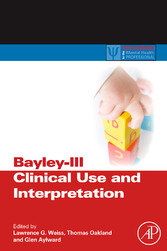Suchen und Finden
Bayley-III Clinical Use and Interpretation
One of the most widely used assessments of infants and toddlers, the BAYLEY-III measures the major areas of development including cognitive, language, motor, social-emotional, and adaptive functioning. This book provides an introduction into use of the BAYLEY-III in each of these five areas. For each of these areas, individual chapters cover the relevant test content, administration, scoring, interpretation, strengths / concerns, and uses in clinical populations. Each chapter also includes a real life case study demonstrating typical performance of a child with delays one of the five areas of development. The book concludes with a special chapter on procedures for brief neurodevelopmental screening of infants in pediatric settings. Covering all major areas of development, the book is informative for a wide range of professionals who use the BAYLEY-III to evaluate development of infants and toddlers from multiple perspectives including psychology, speech and language, and occupational/physical therapy.
- Provides an overview of the theoretical background and structure of BAYLEY-III written by the lead Research Director
- Introduces practitioners to the test content in each of the five major areas of child development covered by the BAYLEY-III: cognitive, language, motor, social-emotional, and adaptive functioning
- Readers will learn how to competently administer, score, and interpret each of the five scales in the BAYLEY-III
- Explains the strengths and limitations of the test in each of the five areas it measures
- Instructs readers on uses of the test in specific clinical populations
- Includes five case studies showing typical patterns of children delayed in one of the five areas of development
- Concludes with a special chapter on neurodevelopmental screening procedures in pediatric settings
Alle Preise verstehen sich inklusive der gesetzlichen MwSt.









